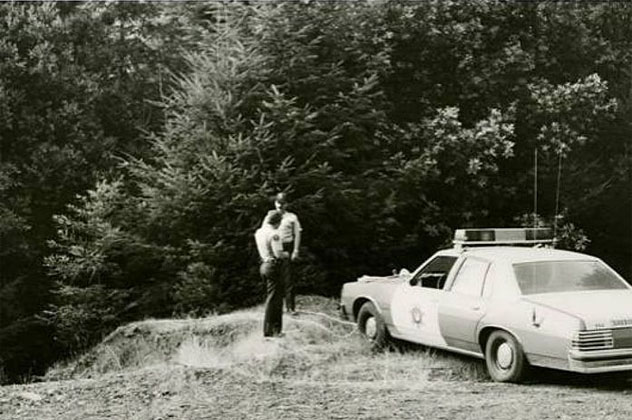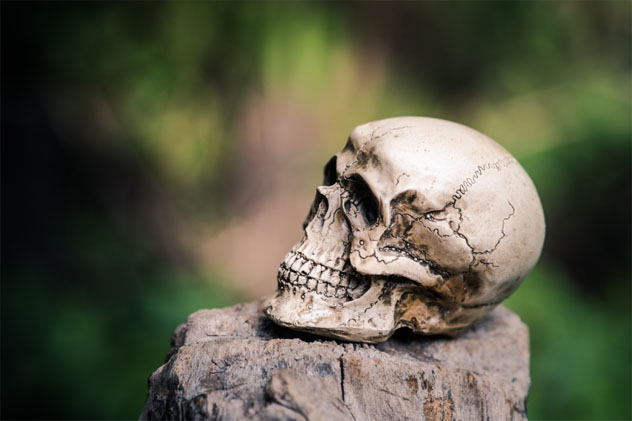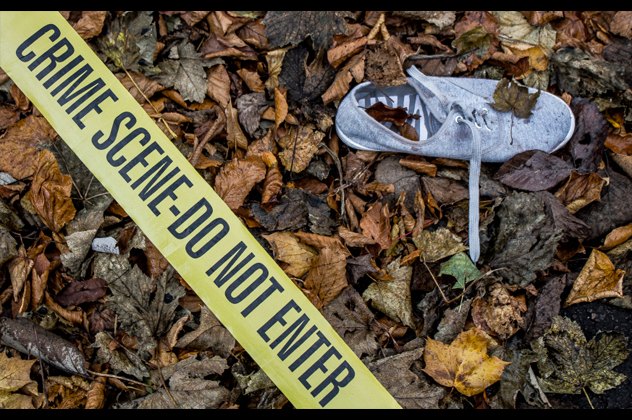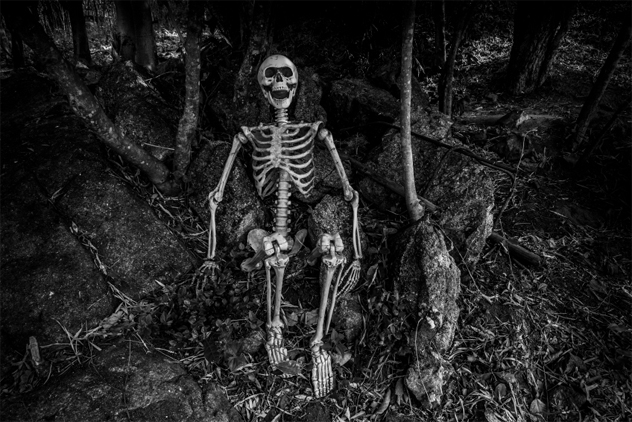 Mysteries
Mysteries  Mysteries
Mysteries  History
History 10 Surprising Stories About the Texas Rangers
 Humans
Humans 10 Philosophers Who Were Driven Mad by Their Own Theories
 Miscellaneous
Miscellaneous 10 Video-Game-Worthy Weapons and Armors from History
 Weird Stuff
Weird Stuff 10 Psychics Who Accurately Predicted Wartime Events
 The Arts
The Arts 10 Pieces of Art Inspired by a Broken Heart
 Health
Health 10 Science Fiction-Sounding New Medical Treatments
 History
History 10 Surprising Facts About the Father of Submarine Warfare
 Space
Space Ten Astonishing New Insights into Alien Worlds
 Weird Stuff
Weird Stuff 10 Bizarre Summer Solstice Rituals Still Practiced Today
 Mysteries
Mysteries Top 10 Haunting Facts About the Ghost Ship MV Alta
 History
History 10 Surprising Stories About the Texas Rangers
 Humans
Humans 10 Philosophers Who Were Driven Mad by Their Own Theories
Who's Behind Listverse?

Jamie Frater
Head Editor
Jamie founded Listverse due to an insatiable desire to share fascinating, obscure, and bizarre facts. He has been a guest speaker on numerous national radio and television stations and is a five time published author.
More About Us Miscellaneous
Miscellaneous 10 Video-Game-Worthy Weapons and Armors from History
 Weird Stuff
Weird Stuff 10 Psychics Who Accurately Predicted Wartime Events
 The Arts
The Arts 10 Pieces of Art Inspired by a Broken Heart
 Health
Health 10 Science Fiction-Sounding New Medical Treatments
 History
History 10 Surprising Facts About the Father of Submarine Warfare
 Space
Space Ten Astonishing New Insights into Alien Worlds
 Weird Stuff
Weird Stuff 10 Bizarre Summer Solstice Rituals Still Practiced Today
10 Victims Who Went Unidentified for Years
Every year, there are numerous men and women who are found deceased and remain unidentified, so they simply become known as John or Jane Doe. In the past, the odds of being able to uncover their identities were not good. Thankfully, within the past few decades, we have seen remarkable advances in forensic science and DNA technology, so identifying these victims is no longer impossible.
These advances have allowed for the closure of several cold cases involving unidentified decedents. In fact, some of those cases have been featured right here on Listverse. Even if the victim had been deceased for several decades, DNA testing allowed for their positive identification. Here are some more cases where a John or Jane Doe remained unidentified for years until dedicated sleuths helped them get their names back.
10Barbara Ann Hackman-Taylor, ‘Tent Girl’

On May 17, 1968, a well digger named Wilbur Riddle was walking down a dirt road near Route 25 just outside Lexington, Kentucky. He came across a large green tarpaulin normally used for transporting carnival tents. It turned out that the nude, decomposing body of a young woman was wrapped up inside. She appeared to be in her twenties and had been dead for months. Her exact cause of death could not be determined, but it was theorized that she was knocked unconscious and died of suffocation after being wrapped in the tarpaulin. The victim could not be identified and became known as “Tent Girl.”
Decades later, Wilbur Riddle’s son-in-law, Todd Matthews, become obsessed with uncovering Tent Girl’s identity. He created a website devoted to the case, and eventually, he came across a classified ad from a woman who was searching for her missing sister, Barbara Ann Hackman-Taylor. At age 24, Barbara had mysteriously disappeared from Lexington in December 1967. Matthews thought she bore striking similarities to Tent Girl and arranged to have the unidentified woman’s body exhumed. In April 1998, DNA testing determined that Barbara Ann Hackman-Taylor and Tent Girl were the same person.
The exact circumstances of Barbara’s death are still unknown, but the prime suspect was her husband, George Earl Taylor, who happened to be a carnival worker. He never filed a missing persons report and told Barbara’s family that she had left him for another man. However, George took all of his secrets to the grave when he died of cancer in October 1987. Todd Matthews has since gone on to found the Doe Network, an online database containing thousands of profiles for unidentified decedents.
9Carol Ann Cole, ‘Bossier Doe’

On January 28, 1981, a man named John Chesson was on a hunting trip with his family in Bossier Parish, Louisiana, when he came across the body of a teenage girl. She had been stabbed to death and was most likely in the woods for four to six weeks before she was discovered. The victim could not be identified, and for the next several decades she was known as “Bossier Doe.” In February 2015, the Bossier Parrish sheriff’s office decided to start a Facebook page for Bossier Doe in the hopes of uncovering her identity. Shortly thereafter, they received a tip about a Craigslist ad for a missing 17-year-old named Carol Ann Cole, whose photograph seemed to resemble Bossier Doe.
In 1980, Carol Ann lived with her mother in San Antonio until she was placed into a home for troubled girls. In November of that year, Carol Ann ran away from the home and disappeared. The last contact she made with her family was when she phoned her grandmother from a residence in Shreveport, Louisiana. One of Carol Ann’s childhood friends had made the Craigslist ad for her and police eventually got in touch with Carol Ann’s family. They used DNA testing to confirm that the missing girl was Bossier Doe.
In a strange turn of events, John Chesson became a person of interest in her death. Chesson’s daughter claimed that her father once picked up a young female hitchhiker who resembled Carol Ann. She believed he took his family hunting in order to discover her body and fabricate an alibi. Chesson is currently in prison for the 1997 murder of an elderly woman but has yet to be conclusively linked with Carol Ann Cole’s murder.
8Kerry Graham And Francine Trimble

On July 8, 1979, the skeletal remains of two young people were discovered in a wooded area near Route 20 in Mendocino County, California. Both of the victims had been bound with duct tape and wrapped in plastic before they were buried in a shallow grave. Due to the advanced state of decomposition, it was impossible to determine the exact cause of death. The only distinctive clue at the scene was an earring with a dangling bird. It was initially determined that the victims were male and female, and possibly brother and sister. Neither of them could be identified, and they remained a John and Jane Doe for many years.
Two decades later, a thorough analysis was done of the victims’ teeth, and the dissimilarities between their jaws seemed to rule out the possibility of them being related. In 2011, DNA testing produced another shocking revelation: Both of the victims were actually female. This completely changed the course of the investigation, and the bodies were connected to the disappearance of two teenage friends: 15-year-old Kerry Graham and 14-year-old Francine Trimble. The girls had lived in Forestville, California, and vanished without explanation after leaving their homes to visit a shopping mall in December 1978. Even though they disappeared together, Kerry was not reported missing until a couple weeks after Francine, so it took awhile for investigators to connect the two cases. In February 2016, DNA testing officially confirmed that the victims were Kerry Graham and Francine Trimble. The exact circumstances surrounding their deaths remain unknown.
7Barbara Precht, ‘Pearl Lady’

On November 29, 2006, the body of an elderly woman was pulled from the Ohio River near the town of North Bend. She appeared to be in her sixties, but carried no identification. An autopsy determined that she suffered from arthritis, and her injuries seemed to suggest that she had fallen into the river from a great height. The most distinctive clue was a gold pearl necklace the woman wore, earning her the nickname “Pearl Lady.” Even when photos of the necklace were released to the public, no one could figure out who she was.
Finally, in 2014, investigators were able to match Pearl Lady’s fingerprints to a woman who was arrested for shoplifting food 28 years earlier. The woman had been living in San Diego under an alias at the time she was arrested, and it turned out her real name was Barbara Precht and that she was 69 years old when she died. Barbara had been married to James Precht for several decades, and the couple had two children. They resided in Cincinnati before inexplicably fleeing to California during the 1980s to live under new identities.
After Barbara’s arrest, the couple gave up both their children for adoption and eventually moved back to Ohio. Once Barbara was identified, police tracked down James Precht, who pretended to be someone else. James was arrested for lying to the police and spent a month in jail after pleading guilty to a charge of disorderly conduct. Since James never reported Barbara missing, he remained a person of interest in her death. There is still no evidence to prove he was responsible.
6Jon-Niece Jones, ‘Baby Bones’

On March 18, 2005, a man was hunting in a wooded area in Upper Freehold Township, New Jersey, when he came across a skull which appeared to belong to a child. After police performed a search, they discovered that more human remains had been buried in the forest. They also found some burned items which suggested that someone set the victim’s body on fire to destroy evidence. The victim was believed to be a young girl who had been murdered years earlier. In spite of a public plea for information, the child could not be identified and became known as “Baby Bones.”
The case remained cold until August 2012, when investigators were contacted by a young woman named Iyonna Jones, who suspected that “Baby Bones” was her younger sister, Jon-Niece Jones. Ten years earlier, Iyonna and Jon-Niece lived in Harlem with their abusive and neglectful mother, Elisha. Iyonna believed that Elisha caused Jon-Niece’s death and had memories of her deceased sister being placed into garbage bags on August 15, 2002. According to Iyonna, her uncle James, aunt Likisha, and Likisha’s husband, Godfrey Gibson, all conspired with Elisha to burn Jon-Niece’s body and dispose of her remains in Upper Freehold Township. DNA testing would prove that Baby Bones was in fact Jon-Niece Jones. Elisha Jones died in December 2002, but James Jones, Likisha Jones, and Godfrey Gibson were all charged for their roles in the crime. Since it seemed likely that Elisha was solely responsible for Jon-Niece’s death, the other three conspirators agreed to take plea deals and received sentences of probation for assisting with the cover-up.
5Richard ‘Dickie’ Hovey And Eric Jones

During a five-month span, the unidentified remains of two young men were discovered in rural areas of Ontario, Canada. On December 17, 1967, male skeletal remains were found in Balsam Lake Provincial Park near the town of Coboconk. The only clothing at the scene was a pair of white tennis shoes, and the victim’s hands were bound behind his back. On May 15, 1968, the decomposed body of another young man was discovered in an isolated field near the town of Schomberg. Like the first victim, this man was also naked and his hands were bound behind his back. It was 40 years before either of them would be identified.
In November 2006, the Ontario Provincial Police held a press conference to announce that they had constructed clay busts of both victims’ heads, which provided forensic reconstructions of what their faces looked like. It wasn’t long before tips started coming in from people who believed the busts resembled their missing relatives. A month later, the Schomberg victim was positively identified as Richard “Dickie” Hovey, a 17-year-old aspiring musician who traveled to Toronto from his native Fredericton, New Brunswick in 1966 before breaking off all contact with his family.
In March 2009, the other victim was identified as 18-year-old Eric Jones, who had vanished without explanation from Toronto in 1967. One of Eric’s sisters watched a television show showcasing the clay reconstruction of the victim and was struck by its resemblance to her missing brother. Given the similarities between the two crimes, it’s likely that Dickie Hovey and Eric Jones were murdered by the same person. To this day, the killer remains unknown.
4Peggy Sue Houser

On January 3, 1982, the skeletal remains of an unidentified female were found in a wooded area in Hillsborough County, Florida. It was believed that the victim was between 14 and 20 years old, but there was no clothing or identification anywhere at the scene. She remained a Jane Doe for three decades before dental records were compared between the victim and 20 other girls who had gone missing during the same time. One likely candidate seemed to be 18-year-old Peggy Sue Houser, who had disappeared on June 14, 1981. That night, Peggy had gotten into an altercation at a Tampa bar 16 kilometers (10 mi) away from where the victim was found. She left on her own and planned to hitchhike home, but she never arrived. The only problem was that Peggy’s dental records didn’t match the Jane Doe’s.
When a forensic anthropologist named Erin Kimmerle was asked to work on the case in 2011, she could not help but think there had been a mistake. Peggy was ruled out as being the Jane Doe because the dental records showed that the victim had more teeth than Peggy. Kimmerle then noticed that Peggy’s dental records were taken when she was only 12 and didn’t have all of her permanent teeth yet. After she performed a thorough comparison between Peggy and the skeletal remains, Kimmerle became convinced that they were the same person. DNA samples were taken from Peggy’s surviving family members and they conclusively determined that she was the Jane Doe. The identity of Peggy Sue Houser’s killer is still unknown.
3Lisa Gay Howard, ‘Boulder Jane Doe’

On April 8, 1954, the nude, battered body of a young woman was discovered on some rocks next to a stream in Boulder Canyon, Colorado. It was believed that the victim had been there about one week. Her injuries included a fractured skull and jaw, and it appeared that she was thrown from a great height while she was still alive. Investigators checked out missing persons reports, and for decades, she was known as “Boulder Jane Doe” or “the battered blonde of Boulder Canyon.”
Over the years, a historian named Sylvia Pettem became fascinated with the case and decided to write a book about it. She raised money to exhume Boulder Jane Doe’s body to extract a DNA sample. In 2009, Pettem was contacted by a woman named Michelle Fowler, who was interested in finding out what happened to her great-aunt, Barbara Gay Howard. In 1954, Barbara was 18 years old and lived with her family in Phoenix before she vanished without explanation. In spite of her young age, Barbara had already been married and divorced, and she’d secretly gotten married to another man before her disappearance. Barbara’s family didn’t learn about the marriage until after she went missing.
It was suspected that Barbara might have run away to visit an aunt in Denver, which made Michelle Fowler wonder if Boulder Jane Doe was her long-lost great-aunt. The DNA testing was performed, and it turned out that they were a perfect match. The serial killer Harvey Glatman, who murdered three women in California during the 1950s, became a suspect of her death, but he lived in Colorado during that time. Glatman was executed in 1959, and the truth may never be known.
2Gail Delano, ‘Jackie Stafford’

On June 21, 1986, a woman appearing to be in her mid-thirties checked into the Hilton hotel in Mobile, Alabama. She paid for two nights under the name “Jackie Stafford” and listed her hometown as San Diego. After three days, the woman had not checked out, and a search of her room led to the discovery of her body. Jackie Stafford had committed suicide by overdosing on prescription drugs used to treat depression. She had no identification on her, and it seemed likely that “Jackie Stafford” wasn’t her true name. The woman remained a Jane Doe until an episode of the TV show Unsolved Mysteries aired on October 5, 1988.
The show chronicled the unsolved disappearance of Gail Delano, a 36-year-old single mother who vanished from her hometown of Westport Island, Maine. On June 21, 1986, Gail told her two sons she was going on a blind date with a man she had met through a personal ad. She never came home, and her car was found in the parking lot of a restaurant in Brunswick. Gail’s car keys and purse were also discovered at the scene. After the Unsolved Mysteries episode aired, they immediately received tips from the Mobile medical examiner’s office, who believed Gail Delano was the mysterious “Jackie Stafford.” The dental records proved their thoughts. It is theorized that Gail was so overwhelmed with her depression that she decided to stage her own disappearance before taking a flight to Mobile and checking into the hotel to commit suicide.
1Sidney Leslie Goodwin, Titanic’s ‘Unknown Child’

When the RMS Titanic, collided with an iceberg on April 15, 1912, and sank to the bottom of the North Atlantic Ocean, over 1,500 people lost their lives. For nearly a century, one of those victims could not be identified. When the rescue ship, the CS Mackay-Bennett, arrived to recover the victims’ bodies, they found a deceased male toddler. The child could not be matched up with any of the other passengers on the ship, so he was buried in a grave which simply read “Unknown Child.”
For decades, it was suspected that he might be a two-year-old Swedish boy named Gosta Leonard Palsson. In 2001, the child’s body was exhumed, and mitochondrial DNA testing showed no connection to the Palsson family. One year later, analysis was performed of the child’s teeth, and he was identified as Eino Viljami Pannula, a 13-month-old Finnish boy who lost his life in the sinking. Doubts began to emerge soon after the boy’s shoes were donated to a museum. The shoes seemed to be too big for a toddler, and new DNA testing was performed again.
In 2008, the Titanic’s Unknown Child was conclusively identified as 19-month-old Sidney Leslie Goodwin. Sidney was originally born in Melksham, England. He was the youngest child of Frederick and Augusta Goodwin and had five older siblings. The entire family had been third-class passengers on the Titanic and were intending to travel to Niagara Falls to start a new life. The entire Goodwin family perished in the sinking, but young Sidney’s body was the only one to ever be found.
Robin Warder has just started a new true crime podcast called “The Trail Went Cold” in which he analyzes some of the unsolved mysteries he’s written about right here on Listverse. Feel free to contact him here.








